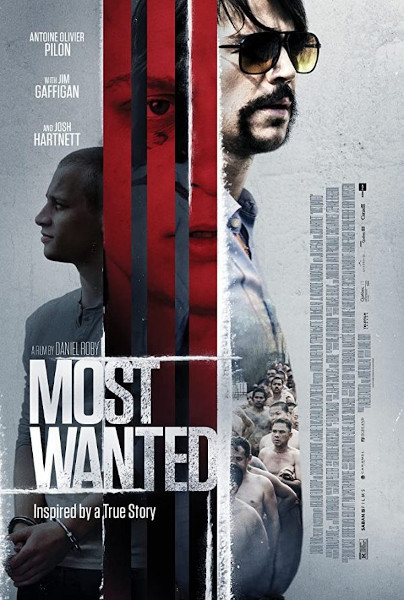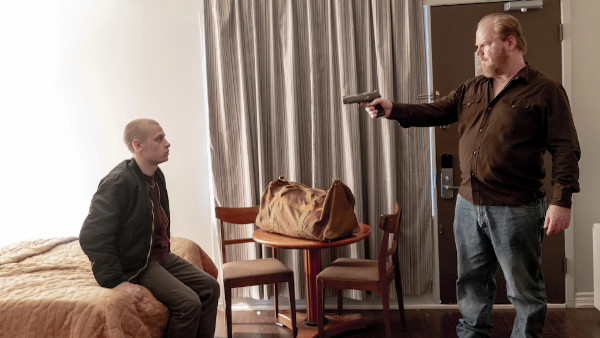'Most Wanted' Reinforces the Significance of a Free Press

AT A GLANCE
Most Wanted
Written and directed by: Daniel Roby
Starring: Josh Harnett, Antoine Olivier Pilon, Jim Gaffigan, Amanda Crew and Stephen McHattie
Rated: R
Available: In select theaters and on demand July 24
Critical rating: 3 stars out of 4
As a film critic and journalism professor, I have a particular interest in movies focused on media. These pictures undoubtedly play a role in shaping public perception of my profession, and reporters have been cast – historically speaking – as everything from cartoon villains to tireless champions of democracy and justice. In Most Wanted, the latest journalism movie making the rounds, Josh Hartnett plays the latter.
Hartnett plays real-life Canadian journalist Victor Malarek, whose career includes a number of film-worthy moments, but the focus here is on a late-1980s investigation alleging an entrapment scheme by government agents. According to the movie – and allegations by Malarek and Alain Olivier – Canadian law enforcement officials coerced Olivier into running a drug operation in Thailand that led to the death of a Mountie and a 100-year prison sentence. Olivier has since been released, but only after spending eight years in a Thai jail.
Although “inspired by real events,” the story is fictionalized, and Malarek’s real name is the only one retained for the film. The broad strokes of the story follow Olivier’s and Malarek’s account of events, but the timeline has been significantly compressed. It is also important to note that Olivier – an admitted junkie at the time of the story – lost a civil lawsuit seeking $47 million as restitution for the time he spent imprisoned.
One needn’t be familiar with the true story to enjoy the film. In fact, it is best viewed as a loose representation of reality that can serve as a springboard for further investigation. From that standpoint, Most Wanted is solid. It will not be remembered as one of the finest media movies ever (a category reserved for classics, including Spotlight and All the President’s Men), but it is a worthy reminder of the importance of quality investigative journalism.

The story starts by introducing Daniel Léger (standing in for the real-life Olivier), a struggling drug addict doing his best to stay afloat financially while nursing inner demons. As portrayed by Canadian actor Antoine Olivier Pilon, Daniel is a mess. His short-lived attempts to do the right thing always descend into drug-fueled benders, making him an easy mark for Picker (Jim Gaffigan), a police informant who trades information for cash.
The film features a fractured timeline, slowly revealing the details leading to Daniel’s arrest as Malarek (who comes to the case long after) attempts to make sense of how the young man wound up imprisoned overseas. As a seasoned reporter, Malarek quickly ascertains that Daniel is not the hardcore international drug-dealer that Canadian law enforcement asserts, so he convinces his editor to send him to Thailand. The more Malerek investigates, the more resistance he faces from authorities, but that only fuels him to push harder, convinced they are hiding an important truth.
Hartnett, a one-time A-lister poised to become one of the biggest names in Hollywood, has flown under the radar for years, by most accounts having chosen this path. Regardless of why we haven’t seen much of Hartnett prior to 2020, he’s a talent, and he does Malerek proud.
Sporting a hip ’80s haircut and thick mustache, Hartnett feels right for the period. Those working in journalism today will laugh when he demands an exorbitant travel budget and copious time to write a two-piece feature about Daniel’s case. But we must remember that this is the ’80s. There was indeed a time when newspapers were raking in profits, and the right player could talk a well-funded publication into investing in a scoop. Even then, the practice was not widespread, but Most Wanted nicely demonstrates how much has changed in journalism over the past three to four decades. Sadly, many of those changes have been for the worse.

Hartnett paints Malarek as a hard-charger who will stop at nothing to get his story, and viewers watch that story unfold as each new detail emerges. The nonlinear structure is complicated, but easy enough to follow thanks to writer-director Daniel Roby’s straightforward style. Roby presents the action simply, letting his actors drive the emotion and his camera go where it needs in order to keep us tuned in. He doesn’t go overboard with artistic flourishes nor does he get overly sentimental or preachy with the plotting. Rather, he presents a mystery with Malarek relentlessly searching for the truth.
There are times when Most Wanted drags. Journalism can, after all, be tedious. Mostly, however, Roby sticks to the good stuff. Malarek takes physical and financial risks, and even sacrifices his home life in pursuit of the story. This is cliché material, to be frank, but it is also entertaining, and Hartnett, Pilon, and the supporting cast are charming enough to keep our attention.
At a time when many newspapers are closing or transitioning to the Internet and “fake news” is a rallying cry for pundits, it’s nice to see a film assert that the free press plays a crucial role in society. Most Wanted not only does this, it demonstrates how an important piece of journalism can change lives for the better.
Author Bio:
Forrest Hartman, a Highbrow Magazine contributor, is a longtime entertainment journalist who teaches in the Department of Journalism & Public Relations at California State University, Chico.
For Highbrow Magazine





























































































































































































































































































































